Dr. Silvia González dropped out of high school at 16. Life served up plenty of obstacles and challenges after that, yet González has beaten the odds and carved out a remarkable career. Today she serves as the Director of Climate Change, Environmental Justice and Health Research at the University of California Los Angeles, Latino Policy & Politics Institute.
Following a “non-traditional” route throughout her academic career, González took a total of six years to complete her associate’s degree at Los Angeles Valley Community College. At the time, she held down a full-time job and raised two children. It wasn’t until she transferred to the University of California in Los Angeles that she met other academics in the research space, which in turn sparked her interest and passion to pursue research.
“I never thought I would do a Ph.D,” González told CALÓ NEWS in a recent interview. “It was not something that crossed my mind because I was just really focused on putting food on the table for my kids and surviving.”
González said that she recalls the frequent gun violence in her neighborhood of Pacoima, California during the 1990s. The lack of safety she experienced served as further motivation for her to pursue her degree, especially after she became a mother for the first time in 2001.
Now, González credits both the staff at the continuation school she attended as well as her community college professors for spotting her potential. “I was surrounded by a lot of Latino folks who really wanted to support me, and saw potential in me that I didn’t see in myself,” she said, adding that having that type of mentorship from people who shared similar cultural and ethnic backgrounds inspired her academic trajectory.
Attending UCLA
From 2007 to 2009 González attended UCLA for her undergraduate degree, earning a Bachelor of Sciences in Geography and Environmental studies. She went on to pursue her master’s degree in 2011 where she studied Urban Planning, with a focus on Community Economic Development. It was during this time that González began to explore her interest in research. “I really loved having the flexibility to ask questions and to think about how we collect and use different forms of data,” González said. As opportunities continued to present themselves, González said that she knew that she had to take chances, not just for the betterment of herself but for her family as well. “Had I not been around other people of color who taught me the ropes,” she said, “I don’t think I would have ever gotten a PhD or gone to grad school in general.”

Photo of Silvia in cap and gown at Ph.D ceremony. Photo credit: Bo Liu
Although her experience might be an anomaly in the academic world, the reality remains that Latinas are still vastly underrepresented in higher education. About 8% of Latinas earned a master’s degree and 1% have attained a doctoral degree, according to a study published by Excelencia in Education. The Pew Research Center reports that Latinas with “advanced degrees” have increased by 291% since 2000, but the overall numbers remain relatively low.
Barriers in higher education
Funding continues to be one of the leading obstacles for Latinas pursuing higher education, as well as for many other underrepresented students of color. In addition to the fact that undocumented students are not eligible to receive federal financial aid and are even restricted from state funds in some jurisdictions. This can make it difficult for many Latino students to afford the cost of tuition, housing, and other expenses associated with higher education. According to the Pew Research Center, the median household income for Hispanics in the U.S. in 2021 was $59,000, below the overall U.S. median of $67,800. Coupled with gender wage gap disparities, Latinas face additional restrictions in achieving access to higher education.
Claudia López, an associate professor at California State University at Long Beach, says that one of the main reasons she was able to pursue her Ph.D in Sociology at UC Santa Cruz was through the support of the Ronald E. McNair Postbaccalaureate Achievement Program (sometimes referred to as McNair), a program named after astronaut and physicist Dr. Ronald McNair, who lost his life in the space shuttle Challenger shuttle disaster in January 1986. As a Black astronaut and physicist, McNair advocated for a greater number of people of color pursuing advanced degrees.
The federal trio program
The McNair program is a federal trio program funded by the U.S. Department of Education, designed to work with institutions of higher education to prepare participants for doctoral studies through research and other scholarly activities. The program selects participants from a competitive pool of first-generation, historically excluded student populations who demonstrate strong academic potential. A “Fast Facts” report released in 2019–20 states that grantees received funding to serve 5,242 participants and about 16% were Hispanic-serving institutions.
“I didn’t even know it was possible to have a career in research,” López told CALÓ NEWS. As someone who also followed a non-traditional pathway into higher education, López credits the support from the McNair program with her success, especially since she had a later start to her academic career. Although the associate professor currently teaches Qualitative Research Methods, Modern Sociological Thought, and Sociology of Globalization for the Department of Sociology at Cal State, she didn’t start college until she was 30. Out of high school, López worked as a telemarketer in Long Beach where she said she faced exploitative work conditions and was treated poorly by management. “I didn’t even have the words to describe what I was experiencing,” López said. “The bosses would hit on the women [employees] and I was like, that’s really wrong.”

Graduation photo of López taken by Grad Images at Balfour Company.
Driven by aspirations for a better career and work environment, López enrolled in Long Beach City College in 2006, then graduated with a bachelor’s in Sociology from San Jose State University in 2008. She had originally intended to pursue a career in photojournalism but found herself drawn to sociological research because it gave her insight into the structural and historical factors that result in “people having limited decisions.”
Pursuing a masters degree
As the daughter of both Mexican and Colombian immigrant parents, López felt a personal connection to the study of global migration, and the impact of displacement. She pursued both her master’s degree and her PhD in Sociology, at UC Santa Cruz. For her Doctoral degree, López chose a designated emphasis on Latin American and Latinx Studies and Feminist Studies which allowed her to explore research on displacements and forced migration in Colombia and Southern California, examining the links between time, space and belonging in the 21st Century.
As Latino students continue to navigate the hurdles of higher education, many have chosen to give back by pursuing academic leadership positions that address equity gaps. Graduation rates for Latinos at two-year institutions have remained at around 33% since 2018, and stayed at around 52% for those at four-year institutions, according to statistics published by Excelencia in Education.
Serina Bravo, for example, is the Student Programs Advisor and Research Assistant at the University of Southern California. Bravo attained her Doctor of Education (Ed.D) which she says helped her leverage educational leadership skills to support other first-generation college graduates, like herself.
Bravo earned both a bachelor’s degree in Psychology and Social Behavior and a bachelor’s degree in Education Sciences from The University of California Irvine in 2015. As the oldest of her three sisters, Bravo recognized early on in her academic career how important it was to set high standards for her siblings. Bravo’s great-grandparents originally immigrated to the United States from Mexico and her parents primarily derive from Whittier. She told CALÓ NEWS that she always felt a responsibility to be a role model and wanted to be an example for her family. “It has definitely motivated me to pursue my doctorate degree because, even though I’m the first one, I want my sisters to know that they can do it too.”

Image of Serina Bravo at USC’s First Gen Lounge. Photo Credit Michelle Zacarias
Crediting the support system
Bravo credits the support of mentors in academic leadership for helping guide her career decisions. From 2015-2017 she attended the University of Southern California and earned a Master of Education in Postsecondary Administration and Student Affairs. As a Rossier master’s student in 2016, Bravo took an Applied Educational Ethnography class with Research Professor, Zoë Corwin, which focused on research for improving leadership in higher, adult and professional education. The course had a huge impact on Bravo, as she not only excelled but then went on to pursue her Ed.D, with a concentration in Higher Education Administration.
The first several years of Bravo’s Ed.D program at USC were completed virtually because she started in 2020 at the height of the pandemic, which she now says created a challenge in developing social relationships with her cohort and professors. However, once classes returned in person, Bravo said that she was able to make more meaningful connections with like-minded peers.
Bravo’s decision to pursue an Ed.D program was informed by her own experiences navigating academia as a first-generation student of color. “Having that support during a very pivotal time in my life made me want to give back to other college students,” she told CALÓ NEWS, “especially students from historically marginalized student populations that might need that additional support.” Additionally, the Ed.D program allowed Bravo the flexibility to continue working full-time, while she continued to pay off her student loans.
Although funding is frequently cited as one of the reasons why Latinas make up only 1% of students who pursue a doctoral degree, it only serves as a microcosm of a larger issue within higher education. This is why universities have an obligation to advocate for Latine students and invest in the recruitment of “nontraditional” students with talent and potential. The contributions of academics like González, López and Bravo continue to pave the way for future generations of Latine students. It also allows a glimpse into the possibilities that exist for Latine students who may have strayed off the academic path and are choosing to find their way back.
As Associate Professor López says: “I remind my students all the time that they have to be careful about sticking to the idea of a perfect timeline and plan, because it creates boundaries and limits within ourselves.”

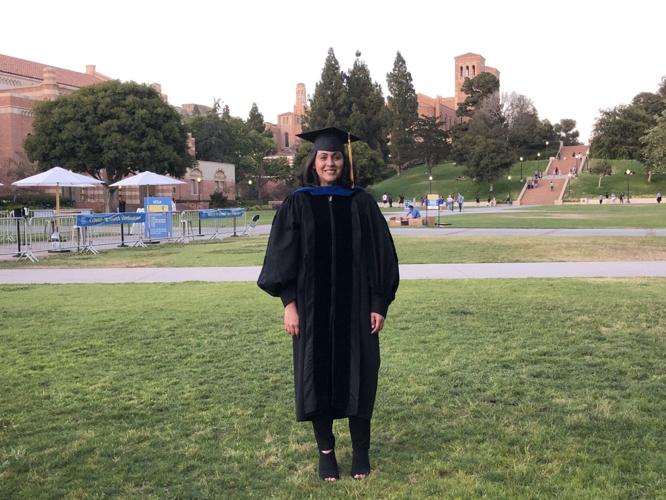
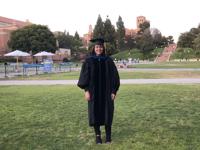
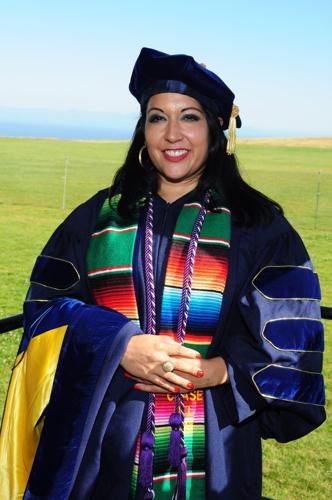
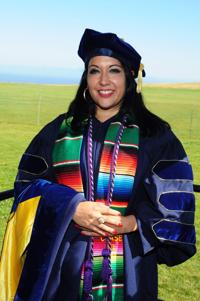
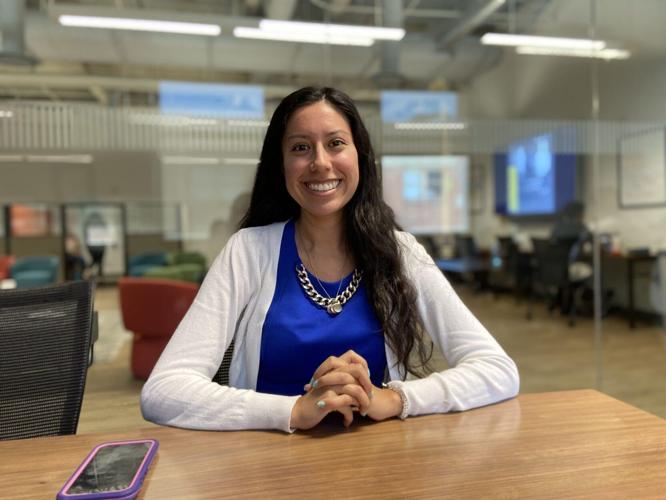
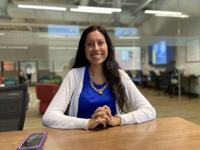

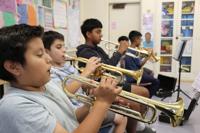





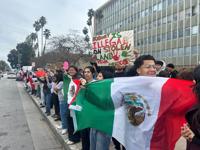
(0) comments
Welcome to the discussion.
Log In
Keep it Clean. Please avoid obscene, vulgar, lewd, racist or sexually-oriented language.
PLEASE TURN OFF YOUR CAPS LOCK.
Don't Threaten. Threats of harming another person will not be tolerated.
Be Truthful. Don't knowingly lie about anyone or anything.
Be Nice. No racism, sexism or any sort of -ism that is degrading to another person.
Be Proactive. Use the 'Report' link on each comment to let us know of abusive posts.
Share with Us. We'd love to hear eyewitness accounts, the history behind an article.